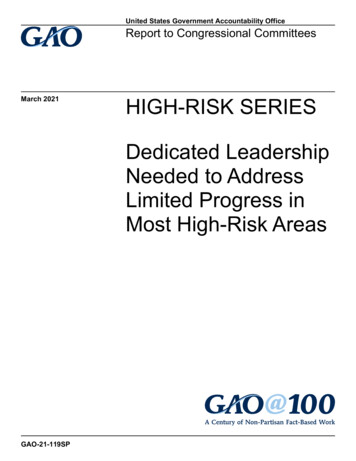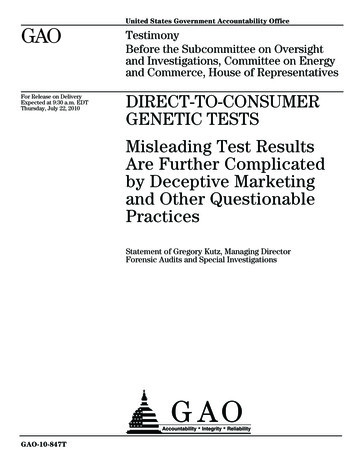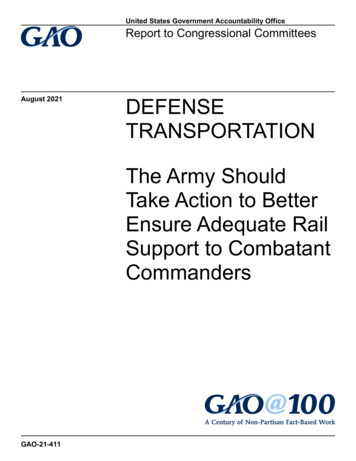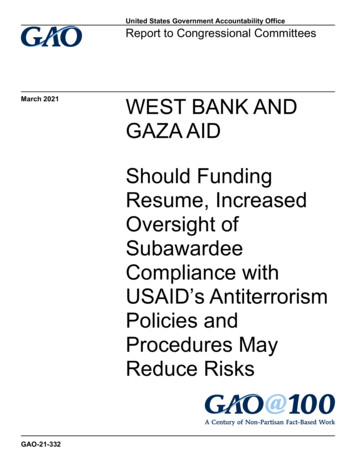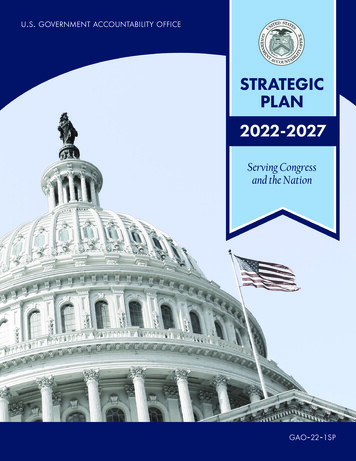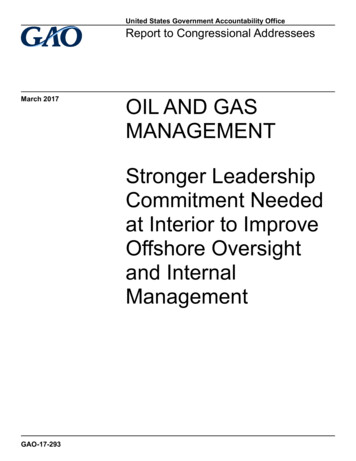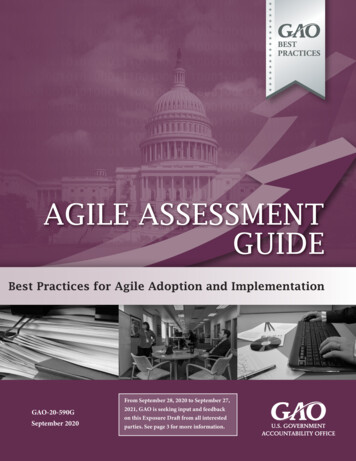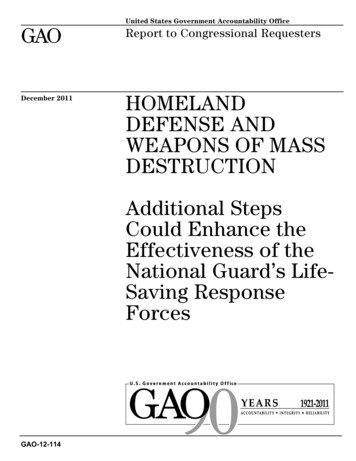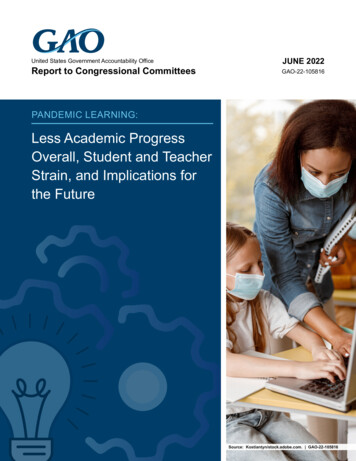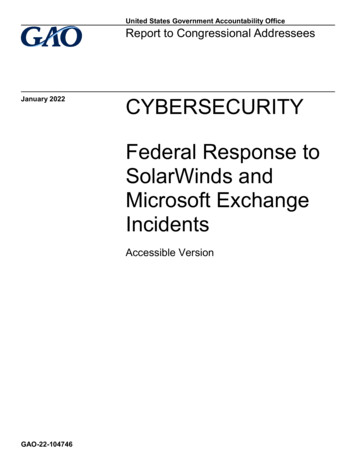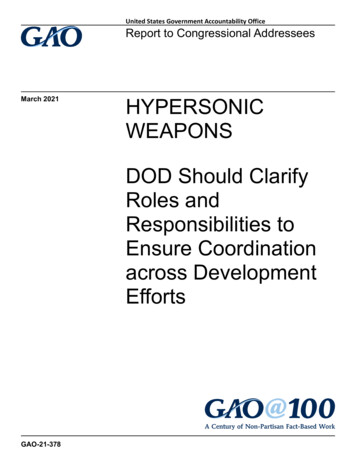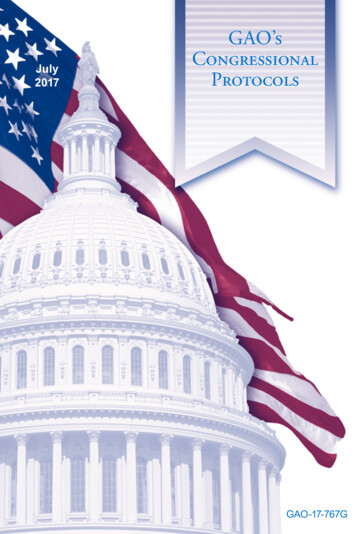
Transcription
July2017GAO’sCongressionalProtocolsGAO-17-767G
GAO’s MissionGAO exists to support the Congress in meeting its constitutionalresponsibilities and to help improve the performance and ensure theaccountability of the federal government for the benefit of theAmerican people.Scope of WorkGAO performs a range of oversight, insight- and foresight-related work tosupport the Congress, including the following: evaluations of federal programs, policies, operations, and performance;management and financial audits to determine whether public funds arespent efficiently, effectively, and in accordance with applicable laws;investigations to assess whether illegal or improper activitiesare occurring;analyses of the financing for government activities;legal opinions to determine whether agencies are in compliance withapplicable laws;policy analyses to assess needed actions and the implications ofproposed actions; andadditional assistance to the Congress in support of its oversight,appropriations, legislative, and other responsibilities.Core ValuesAccountabilitySource: GAO (front and inside front covers).IntegrityReliability
441 G St. N.W.Washington, D.C. 20548Comptroller Generalof the United StatesJuly 17, 2017LertThis document describes protocols governing GAO’swork for the Congress. Designed in consultation withCongress, the Protocols, as originally issued in 2000and updated in 2004, have been effective in allowingGAO to work constructively with the Congress toconduct our work in accordance with congressionalpriorities. The Protocols established well-acceptedprinciples and approaches for communicating with andmaking commitments to the Congress regardingmandates, requests, engagements, and reports.This 2017 update retains these principles andapproaches while making relevant updates. Itincorporates name changes of relevant GAO entities;reflects changes to aspects of GAO’s process forissuing products; provides the names of the mostcurrent GAO contacts; and updates methods forreceiving information about GAO products.Along with all members of the GAO team, I look forwardto continuing our mission of supporting the Congress inmeeting its constitutional responsibilities and helpingimprove the performance and ensure the accountabilityof the federal government for the benefit of theAmerican people. We will continue to monitor theapplication of these protocols and, in consultation withthe Congress, will consider what, if any, refinementsshould be made. I encourage you to contact ourPage 1GAO-17-767G GAO’s Congressional Protocols
Congressional Relations office on (202) 512-4400 if youhave any questions or comments on these protocols.Gene L. DodaroComptroller Generalof the United StatesPage 2GAO-17-767G GAO’s Congressional Protocols
Requests to GAO:Process and TimingPage 3GAO-17-767G GAO’s Congressional Protocols
Page 4GAO-17-767G GAO’s Congressional Protocols
ContentsLetter1Requests toGAO: Processand Timing3GAO’sCongressionalProtocols7GAO’s ApproachGAO’s Statutory Authority and ResponsibilitiesPriorities for Undertaking WorkConsiderations for Accepting RequestsCongressional MandatesCongressional RequestsCommitment to Congressional RequestersCommitment toCo-RequestersNotification of Ongoing WorkAgency CommentsWithdrawal of Requester SponsorshipProduct ReleaseRequests for TestimonyAccess to Audit DocumentationDetailees to the CongressPress This is a work of the U.S. government and is not subject tocopyright protection in the United States. It may be reproducedand distributed in its entirety without further permission from GAO.However, because this work may contain copyrighted images orother material, permission from the copyright holder may benecessary if you wish to reproduce this material separately.Page 5GAO-17-767G GAO’s Congressional Protocols
Page 6GAO-17-767G GAO’s Congressional Protocols
GAO’s Congressional ProtocolsThe following protocols are general principles governingGAO’s audits, program reviews and evaluations, policyanalyses, and investigations for the Congress.GAO’s ApproachTo effectively support the Congress, GAO must beprofessional, objective, fact-based, nonpartisan, andnonideological in all its work. All GAO products andservices must also conform to generally accepted andapplicable auditing, accounting, investigative, andevaluation principles and standards. GAO will efficientlyuse available resources to maximize its ability to meetthe Congress’ needs and exercise the independencenecessary to ensure that its products and work conformto applicable professional standards and the agency’score values of accountability, integrity, and reliability.GAO’s StatutoryAuthority andResponsibilitiesGAO, under various statutory authorities, examines theuse of federal funds; evaluates federal programs andactivities; and provides information, analyses, options,recommendations, and other assistance to help theCongress make effective policy, funding, and oversightdecisions. GAO frequently relies on two generalstatutory authorities to support its work. The Budget andAccounting Act of 1921 authorized GAO to “investigateall matters related to the receipt, disbursement, and useof public money.”1 The Legislative Reorganization Act of1970 authorized GAO to “evaluate the results of aprogram or activity the Government carries out underexisting law” when ordered by either House ofCongress, when requested by a committee ofjurisdiction, or on the initiative of the ComptrollerGeneral.2 To assist GAO in performing its work, the131 U.S.C. §712 (1).31 U.S.C. §717 (b).2Page 7GAO-17-767G GAO’s Congressional Protocols
GAO’s Congressional ProtocolsCongress provided GAO broad rights of access to awide range of agency information.Specifically, the Budget and Accounting Act of 1921directs each agency to give GAO the information theComptroller General requires about the duties, powers,activities, organization, and financial transactions of theagency.3Priorities forUndertaking WorkIn striving to meet the Congress’ needs, GAO seniorofficials consult regularly with senior congressionalleaders and committees to ensure that GAO’s work isprioritized in accordance with their informational andtiming needs. GAO also consults with thesecongressional leaders regarding demands on GAO’sresources by subject matter to help manage andminimize supply and demand imbalances.To ensure adherence to GAO’s core values, effectivemanagement practices, and efficient use of resources,GAO will initiate work according to the followingpriorities:1. Congressional mandates.2. Senior congressional leader and committee leaderrequests.3. Individual Member requests.Congressional mandates include requirements directedby statutes, congressional resolutions, conferencereports, and committee reports. Senior congressionalleaders include the President Pro Tempore, SenateMajority Leader, Senate Minority Leader, Speaker of the331 U.S.C. §716 (a).Page 8GAO-17-767G GAO’s Congressional Protocols
GAO’s Congressional ProtocolsHouse, House Majority Leader, and House MinorityLeader. Committee leaders include the Chair andRanking Member of a committee or subcommittee withjurisdiction over a program or activity.GAO reserves a limited portion of its resources for workinitiated under the Comptroller General’s authority to(1) invest in significant current or emerging issues thatmay affect the nation’s future, and (2) address issues ofbroad interest to the Congress, with an emphasis onlonger-range, crosscutting, and transformational issues.With respect to setting priorities, GAO also considersthe subject matter of the requested work in light ofSenate and House rules governing the committees’jurisdiction over a program or activity, including theirauthorization, appropriation, budgetary, and oversightjurisdiction. When jurisdictional issues arise, GAO willencourage Members and staff to consult with eachother to resolve any related issues through establishedSenate or House procedures.Considerations forAcceptingRequestsGAO can only undertake work that is within the scope ofits authority and competency. In determining whether toaccept congressional requests, along with the scopeand timing of any related work, a range of factors will beconsidered, including but not limited to: the subject matter of the request; GAO’s statutory audit and access authority,including but not limited to, whether the entity,program, or activity to be evaluated receives federalfunds or is carried out under existing federal law; GAO’s professional standards and core values;Page 9GAO-17-767G GAO’s Congressional Protocols
GAO’s Congressional ProtocolsCongressionalMandates the amount of resources involved, including anyrelated cost-benefit considerations; the extent of backlog within any applicable GAOteam that would be responsible for the work; other work being conducted for the requester; whether any related audit or investigation, includinga criminal investigation, is ongoing or imminent byanother governmental entity including, but notlimited to, agency Inspectors General; and whether the matter is pending before administrativeor judicial forums.GAO treats work that is directed by congressionalmandates differently from congressional requests.Because congressional mandates are established byeither the Congress or one or more of its committees, itis GAO’s policy that products prepared in response tocongressional mandates are immediately available tothe Congress and the public. When mandates directGAO to report to a specific committee, GAO will workwith the majority and minority of the designatedcommittee to clarify the scope of work, reportingobjectives, and time frames. If the mandate does notspecify a committee, GAO will work with the committeesof jurisdiction (majority and minority) as set forth inSenate and House rules and any other committeesand/or Members identified by the committees ofjurisdiction. While the work is ongoing, GAO will providethe committees (1) periodic status briefings, (2)briefings on the preliminary and final results of the work,and (3) notification of when the draft product will be sentto the agency for comment. GAO will offer a copy of thedraft for informational purposes.Page 10GAO-17-767G GAO’s Congressional Protocols
GAO’s Congressional ProtocolsCongressionalRequestsCongressional requests for GAO work should be madein writing by a Member and addressed to theComptroller General. Members and their staffs areencouraged to consult with GAO officials in developingrequests for GAO work. GAO will do work without awritten request only if the work involves limited technicalassistance that can be completed within 5 staff days,such as providing briefings on prior work or readilyavailable information. GAO does not generally provideothers with copies of request letters. Rather, GAO willrefer any person who wants a copy of a request letter tothe Member who submitted the request. However, incases where the request letter includes authorization foran agency to release to GAO otherwise restrictedinformation, for example, taxpayer return information,GAO may provide the agency with a copy of the requestletter.For requests that involve work on programs or activitiesrelating to the internal operations of the Congress—theSenate, House, or both—GAO will work with therequester to seek bipartisan and/or bicameral supportfor such requests from either (1) the senior leaders ofthe Senate and/or House or (2) the Chairs and RankingMembers of the Senate and/or House committee(s) ofjurisdiction over the congressional program or activity.When it is not possible to obtain bicameral or bipartisansupport, GAO will work with the requester to notify theother House or party of the request before it commits todo the work.Given relevant legal and other considerations ofteninvolved in work involving multilateral organizations,GAO may need the signatures of a Chair or RankingMember of a committee or subcommittee of jurisdiction.These organizations include the United Nations, theWorld Bank, and the International Monetary Fund.Page 11GAO-17-767G GAO’s Congressional Protocols
GAO’s Congressional ProtocolsGAO does not conduct studies, reviews, evaluations, oraudits of state or local programs or activities that aresolely within the purview of states or local governmentswhere there is no connection to federal matters. GAOdoes review certain state and local activities andprograms that are (1) carried out in furtherance offederal law, such as environmental programs orinsurance regulation or (2) funded by federal programs,such as Medicaid, transportation, or education. Whenappropriate, GAO may consult with state and localauditors regarding their work on these matters. Inaddition, to assist the Congress and its committees indeveloping federal legislation, reexamining the federalrole, or gauging federal performance, GAO sometimesreviews the practices of the states to ascertain “bestpractices” or lessons learned in dealing with particularissues.When GAO receives a request from a Member ofCongress that focuses on a major activity or programthat is solely or largely centered in a specific geographicarea that is represented by Members beyond thoserequesting the work, GAO may advise the Membersrepresenting that geographic area of the timing, scope,and methodology of the work. After advising therequester, GAO may brief such Members shortly beforethe final report is publicly released on the findings,conclusions, and recommendations, without providing acopy of the report before its public release.GAO provides comments on legislative bills when (1)requested to do so by a committee or Member ofCongress, (2) GAO’s authority or responsibilities wouldbe affected by the bill’s passage, or (3) GAO hasinformation that would be useful to committees orMembers in considering or modifying the bill. Incommenting on proposed legislation, GAO’s objective isto identify likely program changes if the bill is enacted orthe impact of such changes on a specific program.Page 12GAO-17-767G GAO’s Congressional Protocols
GAO’s Congressional ProtocolsWhen GAO receives a request that could includeanalysis of a legislative proposal introduced by otherMembers, in the resulting report, it may notify the keybill sponsors. GAO may meet with the key sponsorsduring the fact-finding phase to obtain a betterunderstanding of the purpose and objectives of the bill.After advising the requester, GAO may brief keysponsors shortly before the final report is publiclyreleased on the results of its analysis, including itsfindings, conclusions, and recommendations as theyrelate to the legislative proposal. In these instances,GAO will not provide a copy of the report before it ispublicly available.In limited circumstances, GAO may be unable to do therequested work solely on behalf of a singlecongressional requester. These circumstances involvesituations in which the request addresses an importantissue that has broad interest to multiple committees orthe Congress as a whole.Commitment toCongressionalRequestersGAO will provide to all Members who request work,generally within 10 business days of receipt, a letteracknowledging the receipt of the request and eitheraccepting or declining it. This letter may be augmentedby a verbal communication. When a request isaccepted, GAO will provide the requester an estimate ofwhen the job is likely to be staffed (e.g., immediately,within a few weeks, within several months, or at a futuredate to be determined). When a request is declined,GAO will provide the requester the rationale fordeclining the work (e.g., the requested work is outsideGAO’s scope of authority, GAO already has ongoingwork requested by another Member addressing theissue, or resource constraints limit GAO’s ability torespond to a Member’s request). GAO will, whereappropriate, suggest alternatives to meet therequester’s needs. In consideration of its past practicePage 13GAO-17-767G GAO’s Congressional Protocols
GAO’s Congressional Protocolsfor requests from GAO’s oversight committees—SenateHomeland Security and Governmental Affairs andHouse Oversight and Government Reform—GAO willsend a copy of the acceptance letter to either the Chair(if the Ranking Member submitted the request), or theRanking Member (if the Chair submitted the request), ofthose committees.Congressional requesters should not expect GAO toproceed with the request or provide additional servicesuntil GAO has informed each requester that it willaccept the request. When Members submitindependent requests on the same issue and GAO hasnot accepted the requests, GAO will consult with theMembers and their staffs and will merge requests only ifthe requesters agree. Otherwise, GAO will conduct onebody of work and issue separate products. In limitedcircumstances, however, GAO will work with therequesters to merge multiple requests it receivesrelating to a major event, such as a natural disaster oraccident.After accepting the request, GAO will initiate a meetingwith the requester’s staff generally within 20 businessdays after the engagement is initiated to gain a betterunderstanding of the requester’s need for informationand the nature of the research questions. During thismeeting, GAO will discuss its ability to respond withinthe desired time frame. GAO will advise the requesterthat, as the original requester, only he or she canapprove co-requesters.Once the requester and GAO have agreed to proceedwith the request, GAO will provide the following to therequester: A letter, after the engagement design is completed,confirming agreements reached. The letter willPage 14GAO-17-767G GAO’s Congressional Protocols
GAO’s Congressional Protocolsinclude an estimated timeframe for when the draftproduct will be sent to the agency for comment. Periodic status briefings; notification of anysignificant changed circumstances affecting thescope of work or related time frames for completingthe work (e.g., availability, reliability, or access torecords, data, or sources of information); andbriefing(s) on the preliminary and final results of thework. GAO officials will make every effort toschedule its briefings to accommodate theschedules of the Congress and their staff. Formandates, GAO prefers, but does not require,bipartisan briefings, whenever possible andpracticable.If GAO plans to produce a written product, it will do thefollowing: GAO will notify the requester of the date it will sendthe draft product to the agency for comment andoffer the requester an opportunity to receive a copyof the draft for informational purposes when theagency receives the draft. For products that containnational security or sensitive information, GAO willalso advise the requester when the agency hascompleted its classification or sensitivity review. By law, when a draft product generated under GAO’slegislative authority and not begun because of arequest is sent to the agency, the Senate HomelandSecurity and Governmental Affairs and HouseOversight and Government Reform Committeesmay request a copy. GAO will advise thesecommittees when such drafts are sent to the agencyfor comment.4431 U.S.C. § 718 (b)(2)(B).Page 15GAO-17-767G GAO’s Congressional Protocols
GAO’s Congressional Protocols Allow the requester an option to restrict the publicrelease of a product for up to 30 calendar days afterthe date the product is issued. This restriction doesnot preclude the requester from sharing the productwith other Members.Restricting a report can make its contents unavailablebefore a hearing where the requester plans to use thereport’s contents. In these cases, after consulting with the requester,GAO will reserve the right to allow committeemembers who are part of the hearing to review aphysical copy of the report but not keep it, providedthe information reviewed is not shared publicly untilit is otherwise released. GAO will also release a restricted report, afternotifying the requester, if its contents are released ormade available to the public or if either body of theCongress is considering related legislation.Commitment toCo-RequestersIf any Member is interested in becoming a co-requesterof GAO work, GAO will refer the Member to the originalrequester. If the original requester agrees, the Membercan then become a co-requester any time prior to aproduct’s issuance. GAO will extend the samecommitments to co-requesters as the original requester(see Commitment to Congressional Requesters).However, the co-requester cannot approve additionalco-requesters or restrict the timing of the public releaseof the product.Notification ofOngoing WorkFor any ongoing work—except for classified work andinvestigations—GAO will disclose, if asked (e.g., byMembers, congressional staff, agencies, or the press)the source of the request and the project’s objectives,Page 16GAO-17-767G GAO’s Congressional Protocols
GAO’s Congressional Protocolsscope, and methodology. Additionally, all congressionaloffices have, through the Senate and House intranetconnections to GAO, access to the background and keyresearch questions for active GAO assignments, exceptfor those cases where the reporting of such work wouldresult in disclosing classified or other sensitiveinformation. Active assignments are those that havebeen staffed.Agency CommentsAs required by generally accepted government auditingstandards, GAO will give agencies and other directlyaffected parties the opportunity to comment on a draftproduct to which they are a party. The substance ofthose comments will be published in the product alongwith GAO’s assessment. Also, at the end of datacollection and analysis, GAO will hold an exitconference with agency officials to (1) validate thefactual accuracy of data gathered and (2) discuss theimplications that flow from the data.GAO prefers written comments on its products but willaccept oral comments. Although GAO may give anagency or other affected party up to 30 calendar days tocomment, GAO may attempt to obtain comments inshorter time frames, depending on the needs of therequester and the complexity of the issues involved. Inrare cases, the Comptroller General may grant anextension beyond 30 calendar days if the agency showsthat an extension is necessary and will likely result in amore accurate product.5GAO will not provide an opportunity to comment incases where: (1) disclosure of an investigation’s resultscould pose risks to individuals and their confidentiality;(2) premature disclosure of information could531 U.S.C. §718 (b)(1).Page 17GAO-17-767G GAO’s Congressional Protocols
GAO’s Congressional Protocolscompromise the results of the work; or (3) productslargely reflect prior GAO work.Withdrawal ofRequesterSponsorshipIf requesters or co-requesters decide to withdraw theirsupport of GAO work that will not result in a writtenproduct, they may do so at any time. If a written producthas been planned, the requesters or co-requestersmust advise GAO of their withdrawal before the productis issued. Their withdrawal will not result in thetermination of a product if GAO has expendedsignificant resources and/or the product is in the publicinterest. GAO will, under these circumstances, issue aproduct as if it were undertaken on the ComptrollerGeneral’s initiative. The product may be addressed tocommittees of jurisdiction or the affected agency. Theseproducts will be publicly released like all others.Product ReleaseAll products will have a targeted issuance date that willbe set after GAO has received all agency comments.6GAO will then communicate this targeted issuance dateto the requester and keep the requester apprised of anypotential changes. GAO will accommodate requests forrestrictions on the release of congressionally requestedwork for up to 30 days after the issuance date. GAO willgrant extensions beyond the agreed upon release dateonly in limited cases (e.g., a change in the date of ahearing related to the product). GAO, after consultingwith the requester, will reserve the right to briefinterested committees and subcommittees on the thrustof the report if they are holding a hearing or marking uplegislation relating to the subject matter of the report.After consultation with the requester, GAO may publiclyrelease restricted reports, draft reports, or, on rare6Agencies typically take four weeks to provide comments inresponse to a GAO report.Page 18GAO-17-767G GAO’s Congressional Protocols
GAO’s Congressional Protocolsoccasions, the results of ongoing congressionallyrequested work if the contents of the work or productare released or made available to the public (i.e.,leaked) or if either body of Congress is consideringrelated, pending legislation.Requests forTestimonyRequests for GAO testimony should be made by acommittee or subcommittee Chair in writing. GAO willstrive to respond to all congressional requests fortestimony. However, GAO will decline an invitation totestify when (1) it cannot produce a testimony thatconforms to its core values and standards or (2) thesubstance of the GAO testimony would be newinformation developed for another requester who wantsto restrict the information until its public release. Incases of multiple requests for testimony involving thesame subject matter, GAO will testify on the date of thefirst hearing held and will be available to testify at anysubsequent hearings. For testimony based on newwork, regardless of whether it is a preliminary or finalproduct, GAO will, consistent with professional auditingstandards, obtain the views of agency officials beforethe written testimony is completed to (1) validate theaccuracy of data gathered and (2) discuss theimplications that flow from the data. GAO will distributeits written testimony in accordance with the rules of theSenate or House, including the committees’ rules, andbe available to brief the majority and the minority onmaterial facts, major findings, and conclusions includedin the testimony.Access to AuditDocumentationGAO will grant Members, upon their written request,access to its audit documentation at GAO offices or willprovide copies of selected audit documentation after aproduct has been made publicly available. Specifically,if a member has placed a hold on an issued product,upon the requesting Member(s)’ written request, GAOPage 19GAO-17-767G GAO’s Congressional Protocols
GAO’s Congressional Protocolsmay grant requesting Members access to specific,selected audit documentation. Until the product hasbeen made publicly available, GAO will not providecopies of the audit documentation. After a product hasbeen made publicly available, upon a Member’s writtenrequest, GAO will grant Members access to its auditdocumentation at GAO’s offices or will provide copies ofselected documentation. In both cases, this access issubject to legal and privacy considerations, such asthose concerning taxpayer return information andprotected banking information.Detailees to theCongressBy law,7 GAO staff can be assigned on detail only tocongressional committees, not to leadership orpersonal offices. GAO staff may not engage in partisanactivities or discussions. Committee requests for GAOdetailees should be made in writing and be for specificpurposes for a period not to exceed 1 year. All detaileesmust be approved by the Comptroller General in amanner consistent with the applicable rules and policiesof the Senate or House.Press PolicyIn response to media inquiries about ongoing work,GAO will provide information only about the objectives,scope, and methodology of an assignment; the name ofthe requester; and the expected completion date. GAOwill refer inquiries for any additional information to therequester. As a professional courtesy, GAO will informthe requester of substantive media inquiries during anongoing assignment. Once a product is publiclyreleased, GAO staff with expertise in the subject matterwill answer questions from the media. On-camerainterviews for television news programs are done onlyon request and only when GAO deems them731 U.S.C. §734.Page 20GAO-17-767G GAO’s Congressional Protocols
GAO’s Congressional Protocolsappropriate for public understanding of the facts,findings, conclusions, and recommendations of GAOproducts. GAO’s policy is that senior executives with thebroadest knowledge of a completed assignment dosuch interviews. If asked to participate in press briefingssponsored by the requester, GAO will provide support ifthe press briefing is held in Washington, D.C. In suchinstances, GAO will provide knowledgeable staff withthe understanding that they are present only to answerquestions about the specifics of released GAOproducts. Although GAO does not generally hold pressconferences or issue press releases about products, itdoes advise the media and the public of the release ofGAO products via the Internet and other venues.InvestigationsGAO’s Forensic Audits and Investigative Service team(1) investigates referrals and congressional requestsconcerning specific allegations of federal fraud, waste,abuse, or misconduct and (2) conducts specific projectsthat require special investigative techniques. It is GAO’spolicy to conduct investigations according toinvestigative standards established by the Council ofthe Inspectors General on Integrity and Efficiency(CIGIE) as adapted for GAO’s work. CIGIE standardsplace upon GAO and its investigators the responsibilityto ensure that (1) investigations are conducted bypersonnel who collectively possess the requiredknowledge, skills, and abilities to perform theinvestigations; (2) judgments made in collecting andanalyzing evidence and communicating results areimpartial; and (3) due professional care (e.g.,thoroughness, appropriate use of investigativetechniques, impartiality, objectivity, due respect forindividual rights and privacy, and timeliness) isexercised. GAO’s congressional policies and protocolsapply to investigative work conducted by GAO’sForensic Audits and Investigative Service
Page 1 GAO-17-767G GAO's Congressional Protocols 441 G St. N.W. Washington, D.C. 20548 July 17, 2017 Leret This document describes protocols governing GAO's work for the Congress. Designed in consultation with Congress, the Protocols, as originally issued in 2000 and updated in 2004, have been effective in allowing
